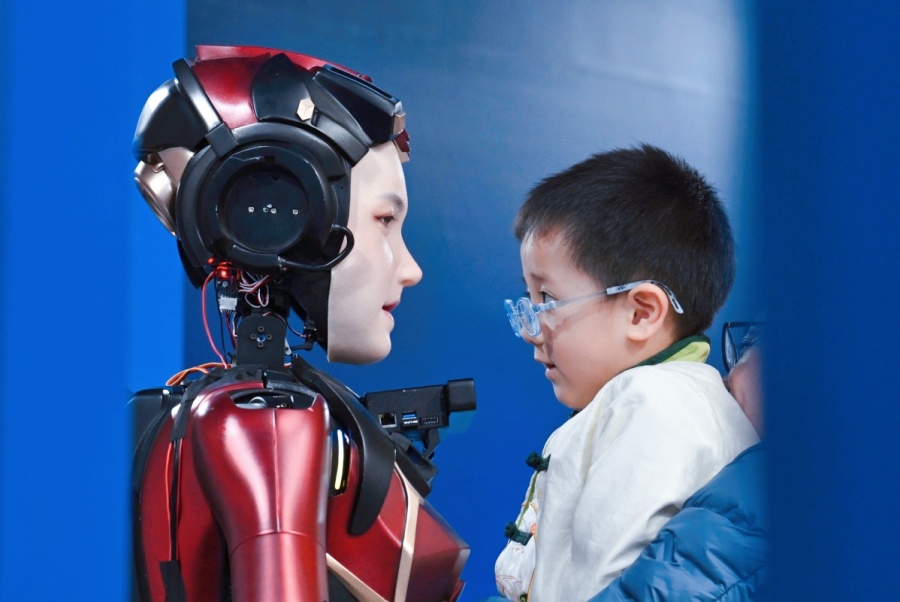
- Home
- Media Center
-
Events
- Wuzhen Summit
- Regional Forums
- Practice Cases of Jointly Building a Community with a Shared Future in Cyberspace
- World Internet Conference Awards for Pioneering Science and Technology
- The Light of Internet Expo
- Straight to Wuzhen Competition
- Global Youth Leadership Program
- WIC Distinguished Contribution Award
- Membership
- Research & Cooperation
- Digital Academy
-
Reports
- Collection of cases on Jointly Building a Community with a Shared Future in Cyberspace
- Collection of Shortlisted Achievements of World Internet Conference Awards for Pioneering Science and Technology
- Reports on Artificial Intelligence
- Reports on Cross—Border E—Commerce
- Reports on Data
- Outcomes of Think Tank Cooperation Program
- Series on Sovereignty in Cyberspace Theory and Practice
- Other Achievements
- About WIC
- 中文 | EN

China walks the talk on humanoid robots
Rapidly growing market to clock $2.9b in sales revenue in 2024, reach around $46.31b by 2031

A young visitor scrutinizes a humanoid skin texture robot during the 2024 World Internet Conference & Light of Internet Expo in Wuzhen, Zhejiang province, on Nov 19. [Photo for China Daily]
US celebrity Kim Kardashian may have turned heads by taking humanoid robots shopping, but China is quietly revolutionizing the game — by not only weaving robots into daily life, but also driving their industrial applications forward by slashing costs and pushing boundaries.
In short, humanoid robots are creating a sensation in China.
From UBTech's agile Walker X to Xiaomi's futuristic CyberOne, homegrown creations are making a splash in the market, showcasing China's capabilities by turning sci-fi dreams into "tangible tech".
But it is just the beginning.
More than 10 Chinese auto giants — including BYD, Chery, and Xpeng — are racing into this futuristic space.
BYD, a Chinese leader in new energy vehicles, is building a cutting-edge embodied intelligence lab, focusing on laying the foundation for the next giant leap in humanoid robotics, sources told China Daily.
The tone-setting Central Economic Work Conference in December also placed AI Plus initiative front and center, aiming to nurture future industries, including humanoid robots, while strengthening the nation's scientific and technological edge.
Xu Xiaolan, former vice-minister of industry and information technology and a member of the Standing Committee of the Chinese People's Political Consultative Conference National Committee, said humanoid robots are expected to become another "disruptive product" after computers, smartphones and new energy vehicles.
"Currently in China, new technologies, products and formats represented by humanoid robots and general artificial intelligence are thriving and becoming the pinnacle of global technological innovation, a new track for future industries and a new engine of economic growth," she said.
Market consultancy Coherent Market Insights has forecast that China's rapidly growing humanoid robot market will clock $2.9 billion in sales revenue in 2024, and skyrocket to around $46.31 billion by 2031, at a staggering compound annual growth rate of 48.6 percent.
Jiao Jichao, vice-president and executive dean of UBTech Robotics' research department, said: "If we compare the humanoid robotics industry to a marathon, China and Western countries are all within the first 1,000 meters of the starting line."
Walker S, the humanoid robot developed by Chinese artificial intelligence and humanoid robotics company UBTech, was the first of its kind in China to carry out full-process handling tasks at an automotive factory.
The company also signed a cooperation agreement with Audi FAW and the Beijing Embodied Intelligence Robotics Innovation Center to jointly develop intelligent solutions for humanoid robots earlier this year.
The cooperation will drive humanoid robots into automotive production lines for intelligent material handling, quality inspection and process material operations. This is expected to promote large-scale deployment of humanoid robots in car factories.
Jiao told China Daily that the company is confident that its humanoid robots will achieve widespread factory applications within three years. "The company aims to deliver humanoid robots in small quantities to industries, especially automobile factories, for handling and sorting tasks, by the end of this year (2024)."

The World Internet Conference (WIC) was established as an international organization on July 12, 2022, headquartered in Beijing, China. It was jointly initiated by Global System for Mobile Communication Association (GSMA), National Computer Network Emergency Response Technical Team/Coordination Center of China (CNCERT), China Internet Network Information Center (CNNIC), Alibaba Group, Tencent, and Zhijiang Lab.





